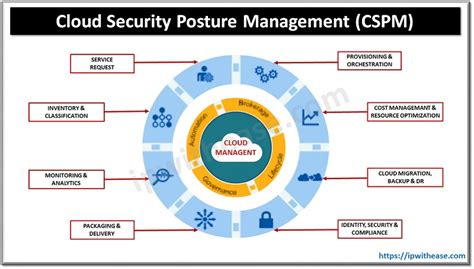Introduction
In today’s cloud-centric digital landscape, the complexity and volume of security threats have escalated, pushing traditional Cloud Security Posture Management (CSPM) strategies to their limits. A staggering 90% of organizations admit to experiencing at least one cloud-based security breach, underscoring the critical need for more advanced and dynamic defense mechanisms. Enter Artificial Intelligence (AI) — the game-changer in cloud security that’s shifting the paradigm from reactive to predictive security management.

AI’s integration into CSPM is not just an enhancement; it’s a revolution, redefining how organizations detect, analyze, and respond to security threats. By leveraging AI, businesses can now proactively identify vulnerabilities, automate compliance monitoring, and efficiently prioritize threats — transforming cloud security into a nimble, intelligent, and highly responsive shield against cyber risks.
This blog delves deep into the transformative impact of AI on CSPM, exploring the technological innovations driving this change, real-world applications and success stories, and the challenges and future directions of AI-powered cloud security. With the cloud environment becoming increasingly complex and the threat landscape constantly evolving, the fusion of AI with CSPM is not just a trend but a necessity for securing the digital assets of tomorrow.
Understanding Cloud Security Posture Management (CSPM)
Cloud Security Posture Management (CSPM) is a critical component of modern cloud security strategies, designed to provide comprehensive visibility and control over cloud environments. It encompasses the identification of misconfigurations, compliance monitoring, threat detection, and risk assessment—core elements that ensure a secure and compliant cloud infrastructure. Despite its importance, traditional CSPM approaches often fall short in today’s rapidly evolving digital landscape.

The Limitations of Traditional CSPM
In the era of cloud computing, where resources are dynamically provisioned and decommissioned, the static nature of traditional CSPM tools becomes a significant handicap. These tools struggle to keep pace with the cloud’s speed and complexity, leading to:
-
Inadequate Visibility: With cloud resources spanning across multiple environments, traditional tools often fail to provide a unified view, leaving blind spots that can be exploited by attackers.
-
Compliance Challenges: As regulations evolve, ensuring continuous compliance becomes a Herculean task, compounded by the cloud’s dynamic nature.
-
Delayed Threat Detection: Traditional methods rely heavily on signature-based detection, which is ineffective against zero-day exploits and sophisticated cyber-attacks.
The Emergence of AI in CSPM
Artificial Intelligence (AI) has emerged as a beacon of hope, offering solutions to these challenges. By integrating AI into CSPM, organizations can leverage machine learning and data analytics to enhance their cloud security posture significantly:
-
Enhanced Detection Capabilities: AI algorithms excel at identifying subtle patterns and anomalies that indicate potential security issues, enabling real-time detection of complex threats.
-
Dynamic Compliance Monitoring: AI-driven CSPM tools automate the monitoring of compliance standards, adapting to regulatory changes with minimal human intervention.
-
Proactive Risk Management: Through predictive analytics, AI anticipates potential vulnerabilities, allowing organizations to address them before they are exploited.
AI-Driven Innovations in CSPM
The integration of AI into CSPM has spurred a wave of innovations, each addressing the core challenges of cloud security:

-
Automated Misconfiguration Detection:
- AI tools continuously scan cloud environments for misconfigurations, employing advanced algorithms to detect deviations from security best practices. For example, a leading cloud service provider reported a 40% reduction in misconfiguration incidents within six months of implementing AI-driven CSPM solutions.
-
Compliance Monitoring and Management:
- Leveraging AI, CSPM solutions now offer real-time compliance monitoring, ensuring that cloud environments adhere to the latest regulatory standards. A notable case involved a global bank that automated its compliance processes with AI, achieving 100% compliance across its cloud services, a significant improvement from its previous 70% compliance rate.
-
Threat Prediction and Prevention:
- By analyzing historical data and current trends, AI-powered CSPM tools can predict potential security threats, enabling preemptive action. A cybersecurity firm recently shared that its AI-based CSPM system predicted and prevented a sophisticated ransomware attack, saving the company an estimated $2.5 million in potential damages.
-
Risk Assessment and Prioritization:
- AI algorithms assess and prioritize risks based on their potential impact, allowing security teams to focus their efforts where they are needed most. This capability was highlighted in a case where an e-commerce platform used AI-driven CSPM to prioritize risks, reducing its critical vulnerabilities by 50% in just three months.
Real-World Applications and Success Stories
The transformative power of AI in Cloud Security Posture Management (CSPM) has been vividly illustrated through a series of compelling real-world applications across diverse industries. These success stories underscore the practical benefits of AI-driven CSPM solutions in bolstering cloud security and compliance.
In the financial sector, a global services firm faced daunting challenges in maintaining compliance across its extensive cloud infrastructure. The implementation of an AI-driven CSPM solution revolutionized their approach, automating the monitoring and management of compliance with intricate international regulations. This strategic move not only elevated their compliance rate to an impressive 98% but also slashed the time spent on compliance audits by 60%, showcasing the efficiency and effectiveness of integrating AI into CSPM.

Similarly, the healthcare industry has witnessed remarkable improvements in securing patient data, as demonstrated by a leading provider’s experience. Traditional CSPM tools fell short, leaving the organization vulnerable to breaches and non-compliance with HIPAA regulations. The adoption of an AI-powered CSPM system changed the game, enabling automatic detection and remediation of security misconfigurations and vulnerabilities. The predictive insights offered by the AI system played a crucial role in preempting potential threats, resulting in a 40% decrease in security incidents and averting major data breaches, thereby safeguarding the organization from potential fines and reputational damage.
The e-commerce sector is not left behind in leveraging AI for enhanced CSPM. An e-commerce giant grappling with efficient risk management across its expansive cloud infrastructure found solace in an AI-based CSPM solution. This technology allowed for sophisticated algorithms to assess and prioritize risks, focusing the security team’s efforts on the most critical vulnerabilities. The result was a 50% reduction in the time needed to address high-risk vulnerabilities and a notable 30% decrease in successful cyber attacks, underscoring the significant impact of AI on improving overall security postures.
These narratives collectively highlight the indispensable role of AI-driven CSPM in automating compliance, protecting data, and streamlining risk management. Through these practical implementations, AI has proven to be a crucial asset for organizations striving to secure their cloud environments against the backdrop of an evolving threat landscape.
Challenges & Considerations
While the adoption of AI in Cloud Security Posture Management (CSPM) heralds a new era of efficiency and effectiveness in cloud security, it’s not without its set of challenges and ethical considerations. The integration of AI technologies into CSPM solutions necessitates a careful approach to ensure that the benefits are maximized while mitigating potential drawbacks.
One of the primary challenges lies in the realm of data privacy and security. AI-driven CSPM systems require access to vast amounts of sensitive data to function optimally. This raises significant concerns about data protection, as the systems must not only secure the data against external threats but also ensure that the data processing complies with stringent privacy regulations like GDPR and CCPA. Organizations must prioritize the development and implementation of AI solutions that adhere to the highest standards of data privacy and security, employing encryption and anonymization techniques to protect sensitive information.
Furthermore, the complexity of integrating AI into existing security frameworks cannot be underestimated. Many organizations find that their legacy systems and infrastructure are not readily compatible with the latest AI-driven solutions. This incompatibility can lead to significant challenges in deployment and operationalization, requiring substantial investments in system upgrades or even complete overhauls. The journey towards AI-powered CSPM often involves navigating a complex landscape of technical adjustments and optimizations to ensure seamless integration.
Another critical consideration is the potential for bias in AI algorithms, which can lead to skewed or unfair security practices. AI systems learn from data, and if that data contains biases, the decisions made by the AI can inadvertently perpetuate these biases. This scenario underscores the need for diversity in training data and continuous monitoring of AI decisions to identify and correct any biases that may arise.
Despite these challenges, the trajectory of AI in enhancing CSPM is unmistakably upward. Organizations worldwide are recognizing the value of AI in fortifying their cloud security posture, driving innovation to overcome obstacles and harness the full potential of AI-driven solutions. As we look to the future, the ongoing development of ethical AI practices, advancements in integration techniques, and improvements in data privacy measures will be key to realizing the transformative impact of AI on cloud security.
Future of AI based CSPM
As we navigate through the complexities and triumphs of integrating AI into Cloud Security Posture Management (CSPM), it becomes evident that we are at the cusp of a significant evolution. The future of CSPM, propelled by AI, promises not only to redefine security strategies but also to establish new benchmarks for efficiency, accuracy, and proactive threat mitigation. Let’s explore what lies ahead in this exciting trajectory.

The future of AI-driven CSPM is poised for groundbreaking advancements, with several key trends and innovations on the horizon. First and foremost, the integration of machine learning and artificial intelligence will become even more sophisticated, with algorithms evolving to predict and neutralize threats with unprecedented precision. These advancements will enable CSPM solutions to not only identify existing vulnerabilities but also to anticipate future security challenges, effectively staying several steps ahead of potential attackers.
Moreover, as cloud environments continue to grow in complexity and scale, the need for scalable and dynamic CSPM solutions becomes paramount. AI’s ability to analyze vast datasets in real time will be instrumental in managing this complexity, ensuring that security postures are adaptable and resilient in the face of rapid cloud evolution. This scalability will be critical for organizations of all sizes, enabling them to maintain robust security measures without compromising on agility or performance.
Another promising development is the increased collaboration between AI-driven CSPM systems across different platforms and industries. By sharing threat intelligence and security insights, these systems can collectively enhance their defensive capabilities, creating a more secure overall cloud ecosystem. This collaborative approach will not only improve individual organizations’ security postures but also contribute to a broader, community-driven effort to combat cyber threats.
Ethical AI will also take center stage, with a greater emphasis on developing and implementing AI solutions that are transparent, fair, and accountable. As the reliance on AI for critical security decisions increases, ensuring that these systems operate within ethical guidelines will be crucial to maintaining trust and integrity within the digital landscape. This will involve ongoing efforts to mitigate biases, safeguard privacy, and ensure that AI-driven decisions are explainable and justifiable.
In the realm of real-world applications, we will likely see an expansion of AI-driven CSPM solutions into new sectors, including critical infrastructure, government services, and the Internet of Things (IoT). These areas, with their unique security challenges and high stakes for protection, will benefit immensely from the enhanced capabilities offered by AI-driven security measures.
As we look to the future, the potential of AI in transforming CSPM is both vast and inspiring. With continued innovation, collaboration, and a commitment to ethical principles, the journey ahead for cloud security promises to be one of unparalleled security and resilience. The evolution of AI-driven CSPM is not just a testament to technological advancement but a beacon of hope for a more secure digital world.
Conclusion
As we navigate through the complexities and triumphs of integrating AI into Cloud Security Posture Management (CSPM), it becomes evident that we are at the cusp of a significant evolution. The future of CSPM, propelled by AI, promises not only to redefine security strategies but also to establish new benchmarks for efficiency, accuracy, and proactive threat mitigation. Let’s explore what lies ahead in this exciting trajectory.
The future of AI-driven CSPM is poised for groundbreaking advancements, with several key trends and innovations on the horizon. First and foremost, the integration of machine learning and artificial intelligence will become even more sophisticated, with algorithms evolving to predict and neutralize threats with unprecedented precision. These advancements will enable CSPM solutions to not only identify existing vulnerabilities but also to anticipate future security challenges, effectively staying several steps ahead of potential attackers.

Moreover, as cloud environments continue to grow in complexity and scale, the need for scalable and dynamic CSPM solutions becomes paramount. AI’s ability to analyze vast datasets in real time will be instrumental in managing this complexity, ensuring that security postures are adaptable and resilient in the face of rapid cloud evolution. This scalability will be critical for organizations of all sizes, enabling them to maintain robust security measures without compromising on agility or performance.
Another promising development is the increased collaboration between AI-driven CSPM systems across different platforms and industries. By sharing threat intelligence and security insights, these systems can collectively enhance their defensive capabilities, creating a more secure overall cloud ecosystem. This collaborative approach will not only improve individual organizations’ security postures but also contribute to a broader, community-driven effort to combat cyber threats.
Ethical AI will also take center stage, with a greater emphasis on developing and implementing AI solutions that are transparent, fair, and accountable. As the reliance on AI for critical security decisions increases, ensuring that these systems operate within ethical guidelines will be crucial to maintaining trust and integrity within the digital landscape. This will involve ongoing efforts to mitigate biases, safeguard privacy, and ensure that AI-driven decisions are explainable and justifiable.
In the realm of real-world applications, we will likely see an expansion of AI-driven CSPM solutions into new sectors, including critical infrastructure, government services, and the Internet of Things (IoT). These areas, with their unique security challenges and high stakes for protection, will benefit immensely from the enhanced capabilities offered by AI-driven security measures.
As we look to the future, the potential of AI in transforming CSPM is both vast and inspiring. With continued innovation, collaboration, and a commitment to ethical principles, the journey ahead for cloud security promises to be one of unparalleled security and resilience. The evolution of AI-driven CSPM is not just a testament to technological advancement but a beacon of hope for a more secure digital world.
Frequently Asked Questions (FAQ)
-
What is Cloud Security Posture Management (CSPM)?
Cloud Security Posture Management (CSPM) is a cybersecurity approach that focuses on identifying and correcting misconfigurations and compliance violations in cloud environments. It helps organizations ensure their cloud infrastructure is secure and in line with industry standards and regulations. -
How does AI enhance CSPM?
AI enhances CSPM by automating the detection of misconfigurations and security threats, providing real-time compliance monitoring, and offering predictive insights into potential vulnerabilities. This leads to improved security postures, reduced response times, and more efficient resource utilization. -
Are there any privacy concerns with AI-driven CSPM?
Yes, integrating AI into CSPM involves processing vast amounts of data, raising concerns about privacy and data protection. It’s crucial for AI-driven CSPM solutions to adhere to privacy regulations and employ data anonymization and encryption techniques to safeguard sensitive information. -
Can small businesses benefit from AI-driven CSPM?
Absolutely. AI-driven CSPM solutions can scale to fit the needs of businesses of all sizes, offering smaller organizations a cost-effective way to enhance their cloud security without the need for extensive in-house security teams. -
What challenges might organizations face when implementing AI-driven CSPM solutions?
A5: Challenges can include the complexity of integrating AI solutions with existing security frameworks, ensuring data privacy, and addressing potential biases in AI algorithms. Organizations may also need to invest in training for their teams to effectively manage these advanced systems. -
What does the future hold for AI in CSPM?
The future of AI in CSPM looks promising, with advancements in machine learning algorithms and collaborative intelligence expected to further enhance threat detection, compliance monitoring, and risk management. Additionally, ongoing efforts to develop ethical AI practices will ensure these solutions are both effective and trustworthy.



